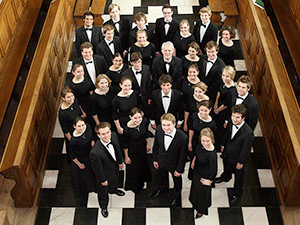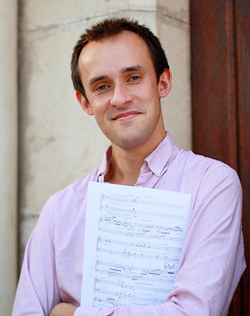by Mike Telin

On Saturday, December 14 beginning at 7:30 pm in Fairmount Presbyterian Church in Cleveland Heights, Graham Ross will lead a program entitled Veni Emmanuel: Music for Advent. The program includes Ramsey’s O Sapientia, Howells’s The fear of the Lord & A Spotless Rose, Byrd’s Vigilate, Shepphard’s Audivi vocem de caelo, Britten’s Hymn to the Virgin, Pärt’s O Morgenstern, Warlock’s Bethlehem Down & the recently-departed John Tavener’s God is with us. The Cleveland performance is the last stop on the choir’s seven-concert U.S. tour and brings one native Clevelander — Clare undergraduate soprano Gabriella Haigh — back to town for Christmas.
Since its founding as a mixed voice choir, the Choir of Clare College has gained an international reputation as one of the leading university choral groups in the world. In addition to its primary function of leading services three times a week in the college chapel, the choir keeps an active schedule of recording, broadcasting, and performing throughout the UK and the world. The choir has toured widely, including in Europe, the United States, Japan, China, Russia, and the Middle East. In 2000 it became the first Oxbridge mixed choir to perform at the BBC Proms.
Why did Clare College decide to break with tradition? “Clare was one of the first colleges to admit women. Alarmingly, it was only forty years ago that that happened, but Clare was one of the first to do so in 1972,” Ross explained. “The director of music at that time was John Rutter and it was his decision to use the fact that the college was admitting women to change the setup of the choir. I know he has said very strongly that he believes that’s been the greatest thing for Clare music.”

Ross points out that the change has also brought stability to the choir’s personnel as well as opening up opportunities for expanding the repertoire they perform. “Before, we had a kind of collection of choristers from around the town who were very much past the college age, who joined the gentlemen who were studying at the college. But there was no kind of fixed setup like you have with the boy choristers at King’s where you have a choir school. So the change meant that the choir could take on a much more rigorous schedule and by using the resources that we have here — which is 50% women — we’re then able to bring new things to the repertoire. I love working with mixed voices. I’ve worked with boy trebles as well, but I think that with the sopranos and altos we’re all on equal footing because they are the same age as the tenors and basses.”
Although the primary reason the choir exists is to provide music for the liturgy, Clare Choir does take on a lot of projects outside. “This year alone we’ve sung The Dream of Gerontius with Mark Elder and last year we toured Beethoven’s Symphony No. 9. The touring nearly always takes place in the vacations – I haven’t yet been allowed to take them out during term time for a tour. But the Cambridge term is extremely short, it’s only eight weeks, so the students’ agendas are very packed and very much seven days a week. Still, the choir does tour about five to six weeks of the year or they spend their time on projects such as recordings.” The choir has recently released Veni Emmanuel: Music for Advent on the Harmonia mundi label. “I do think touring is a huge part of their education,” says Ross. “I think what we learn in the discipline of our daily schedule, then to take that out and to show audiences and congregations around the world — not just through the recordings but through live performance — it’s as much a part of their education as through their academic studies.”
Clare, with an enrollment of around 450 undergraduates, is about middle-sized for Cambridge University colleges and the choir has a membership of 25 or 26. “There is very much a collegiate atmosphere – it’s not like it’s a conservatory and it’s not like it’s just one university with one main choir. So as a school and as a choir it is a small, close-knit group. And the members of the choir naturally become very close to one another very early on in their year. And from my experience they form a group and become friends for life because you see each other more then you see your peers in your academic studies.”
Admission into the Choir is highly competitive. “They sing one or two pieces they’ve prepared and I give them some aural tests, pitch tests and sight reading tests – and of course that is second to the fact that they have to get in to the college academically – first academics then the singing audition. Last year we had 950 applicants to study at Clare College alone and from that about 70 were interested in the choir.”
Choral Evensong is the most regular commitment the choir fulfills in the life of the college, and is the best-known and cherished musical tradition in English cathedrals and collegiate chapels. “Especially in the winter when it’s getting dark around 4, you’re going into a beautiful and quiet place that is open to all. It’s not restricted to Christians. Anyone can come into the chapel and experience something that has been going on for many years completely unchanged. I suppose it’s that formulaic process that many find so beautiful.”
Ross says that something he has never figured out about Cambridge is that when he goes into the chapel to conduct evensong, thirty of his colleagues will do exactly the same thing, at exactly the same time. “There’s nowhere else in the world where so much choral music is going on within one square mile. And of course I never get a chance to hear the others. I imagine that if you’re a tourist in Cambridge it must be an absolute delight because you get to cherry pick where you want to go for your services but often you don’t have enough days to go and see them all. The service of Choral Evensong is a very beautiful tradition and it’s one that I don’t think will ever change. It’s one that students have a great privilege of being able to contribute to and it means a lot to a great many people. Often that is expressed with no words at all.”
Three times a term the Choir also sings Compline, the last service of the day. “We try to get as close to the monastic experience as possible so most of the service is plainchant. We sing an introit or anthem from the 15th or 16th century. Often there’s no organ and it’s sung by candlelight. We do it at 10 o’clock at night so there is very much the feeling that it is the end of the day. Of course nowadays most of the students go to the pub after so perhaps it doesn’t follow the same path as the monks would have done.”
Graham Ross says it’s wonderful, as well as a little bit odd, to be back teaching at the school he graduated from in 2006. “After Clare, I studied orchestral conducting for two years in London then freelanced for two years as a composer and conductor”. Now, in his mid-twenties, Ross is currently in his fourth year as Director of Music at Clare College. “I like to think that because there’s not a massive age difference between the students and myself and because it is fairly recent that I was here I have a good understanding of exactly what they do and what they commit to.”
“I’m young in terms of my colleagues in Cambridge but it’s a wonderful place to work and the students are really what it’s all about – it’s about this education, these extraordinary opportunities that we spend all of our days working in order to give them. It’s something that I very much enjoyed myself as a student. To return that to the future generations of students at Clare is a very wonderful thing for me to be able to do.”
Published on ClevelandClassical.com December 8, 2013
Click here for a printable version of this article.



